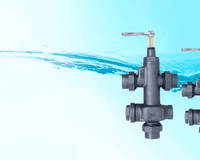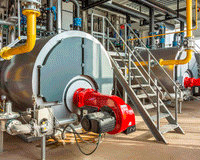Boiler fuels: Discover the most commonly used types

In the national industry, boilers are equipment widely used in various industrial processes with the function of generating steam for various purposes.
For the process to work, different fuels need to be used to supply boiler furnaces, which can be gaseous, liquid and solid, each with characteristics, energy efficiency and costs.
Main boiler fuels used in industries
There are three types of boiler fuels: solid, liquid and gaseous. Each of these types has different commercial forms and energy efficiencies.
In boilers, solid fuels are mainly represented by biomass. Oils are represented by liquid fuels that became popular in the 1970s, with a huge incentive for consumption due to their low cost.
Natural gas, on the other hand, represents a relatively new fuel in the Brazilian energy matrix. Even with its consumption expanding, it still requires several studies to adapt its use in the consumer market.
Gaseous fuels
Gaseous fuels can have mineral and non-mineral characteristics. The most common are Natural Gas and LPG (liquefied petroleum gas).
Natural gas is characterized as a mixture of light hydrocarbons that, at room temperature and atmospheric pressure, remains in a gaseous state. It is also an odorless and colorless gas, which offers a cleaner burn when compared to other gases. It also has good burning efficiency and satisfactory thermal yield.
Produced from a mixture of hydrocarbons, LPG (liquefied petroleum gas) is a gaseous fuel that has a high calorific value, but it is also associated with a low environmental impact, with greater ease of burning and storage.
LPG can be used in different types of industries due to its applicability, safety and the fact that it requires less expenditure during the burning processes.
Liquid fuels
Also with mineral and non-mineral characteristics, boiler fuels in liquid form are the most widely used in industries. However, their use has been decreasing, mainly due to rising prices.
In mineral form, liquid fuels are obtained through petroleum refining, generating gasoline, diesel oil and fuel oil.
Diesel oil is a liquid fuel derived from petroleum and consisting basically of hydrocarbons.
Fuel oil comes from the distillation of petroleum fractions, generally referred to as heavy fractions, obtained after several refining processes.
Non-mineral liquid fuels are represented by alcohols and vegetable oils, but they are rarely used in boilers.
Solid fuels
Solid fuels come in different forms and sizes, and are also the fastest growing boiler fuels in the industrial environment.
Most solid fuels are derived from wood, such as firewood, chips, sawdust, sanding dust, bark, chipboard, plywood and others that have not been treated with halogenated or coated products.
Despite this, in Brazil, among solid fuels, biomass is considered one of the boiler fuels most used in industrial processes, as we will see below.
Biomass: the boiler fuel of the 21st century
Among all solid fuels, biomass has shown great growth in terms of its use in industrial processes, mainly due to its renewable characteristics associated with good availability and excellent cost-benefit.
The most commonly used forms of biomass are:
- Firewood (wood logs);
- Chips (by-product of sawmills);
- Briquette (compact, high-density cylindrical block composed of wood waste in general);
- Agroforestry derivatives, such as sugarcane bagasse
Biomass, in addition to being a sustainable fuel, allows the industry to have the potential to produce a good volume of energy, associated with a smaller amount of polluting gases released into the atmosphere.
Due to its agroforestry characteristics, Brazil is a privileged country in the production of fuels for boilers in the form of biomass, reducing the purchase cost, especially when compared to fuels offered in liquid and gaseous form.
Finally, even with all the possibilities, it is extremely important to emphasize that industries must seek those boiler fuels that best suit their needs, reducing costs and increasing productivity in energy generation.
Take advantage and see what the main precautions to ensure you can keep your boiler working properly .





